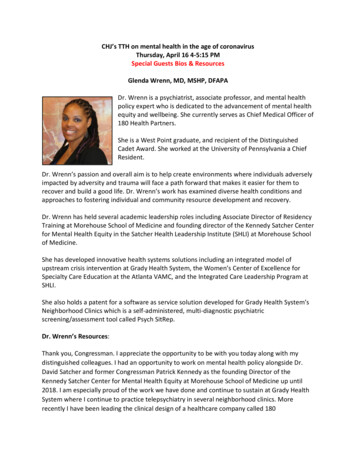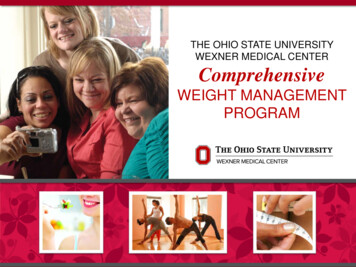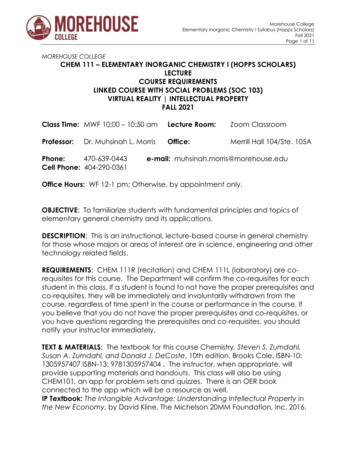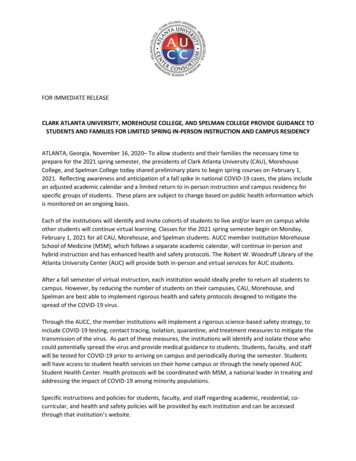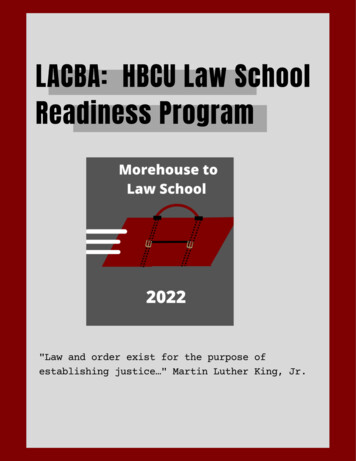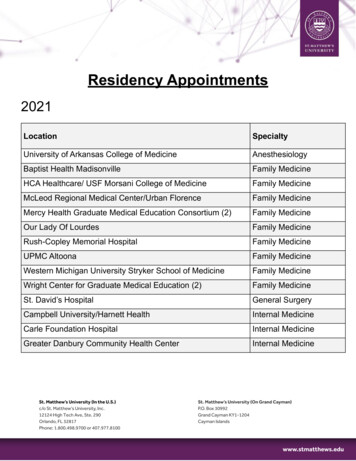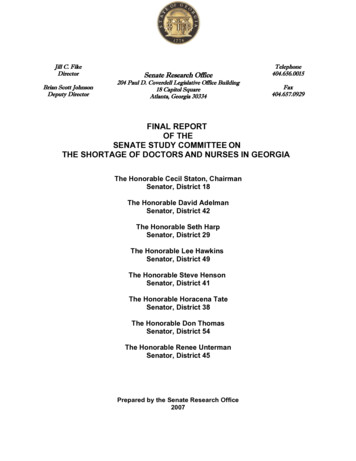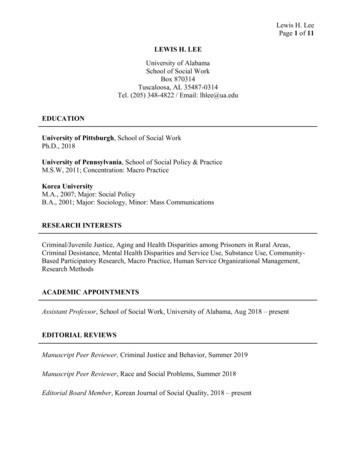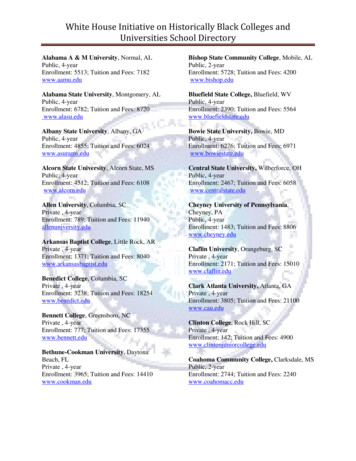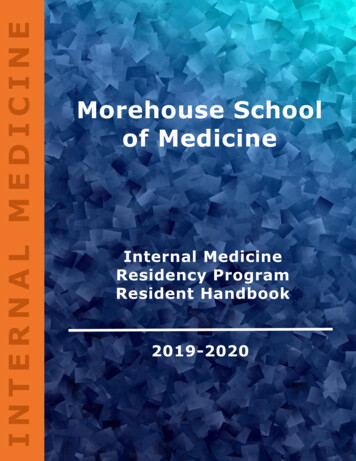
Transcription
INTERNAL MEDICINEMorehouse Schoolof MedicineInternal MedicineResidency ProgramResident Handbook2019-2020
TA BLE OF CONTENTSTABLE OF CONTENTS Message from the Program Director Program Aims and Program Goals and Objectives Administrative Structure 2019-2020 Department of Medicine Residency Program Contact Information 2019-2020 Department of Medicine Resident Roster General Information Certifications Mailboxes Professional Organizations Counseling Services Disputes with Personnel Leave Information: Administrative, Vacation, Holiday, Sick Leave, Post Call, and Availability Administrative/Educational Vacation Holidays Sick Leave Leave of Absence (without pay) Other Leave (FMLA, Maternity, Paternity, etc) Adherence to Policies and Procedures Pagers Dress Code Paychecks Parking Licensure and USMLE Policy Residency Reference Calendar Time Management and Administrative Responsibilities Internal Medicine Residency Program Work Hours Overview Clinical Learning and Work Environment Logging Requirements andOverview Away Electives Conferences Evaluations Examinations Scholarly Activity Resident Assignments by 262628293133
Morehouse School of MedicineInternal Medicine Residency Program720 Westview Drive, S.W.Atlanta, Georgia 30310(404) 756-1325Morehouse School of Medicine Internal Medicine Residency Program is committed to training excellent physicians with an expertisein community-based health delivery and advocacy, aimed at promoting lifelong health habits that decrease health disparities inpoor, rural, racial, and economically disadvantaged populations.Morehouse School of Medicine seeks to provide students with disabilities equal opportunities and equal access to academicprograms, services, and activities. If you have a disability for which you wish to request academic adjustments/accommodations,please contact the Office of Disability Services at the beginning of each semester (or as soon as practicable). The Office of DisabilityServices is located in NCPC, Room 408. You may contact the office at (404) 756-5200 or via e-mail at ODS@msm.edu.
Message from the Program DirectorThe Morehouse School of Medicine Internal Medicine Residency Program is a dynamic,evolving program that seeks to maximize the educational experience of our residents, whileproviding patient-centered, culturally competent care to our patients.Our program is constantly being evaluated, restructured, and expanded. Experiences extend from the hospitalto community based ambulatory sites. Our curriculum also offers exposure to the operating tenets of culturalcompetency, ethics in medicine, patient safety and quality initiatives, end of life care, and high value care.We are always faithful to the mission of Morehouse School of Medicine, to producing caring, competentphysicians. We produce physicians who recognize health care disparities within the health care system andseek to eliminate them through quality patient care, continued quality improvement, advocacy and research.Additionally, we seek to train physicians in the specialty of Internal Medicine who will serve our nation inthose areas where access to quality health care is most needed--serving the underserved. We providetraining in diverse inpatient and outpatient settings. We provide supervision and nurturing at the highest levelensuring that our residents are prepared to face all aspects of medicine in the 21 st century.At MSM we are on a mission as we seek to lead the creation and advancement of health equity.Dr. Ivonye signatureChinedu Ivonye, MDResidency Program Director
PROGRA M A IMSThe Morehouse School of Medicine Internal Medicine Residency Program is designed to develop clinicalexpertise while emphasizing a humanistic approach to patient care. The clinical experiences are intended toensure that residents receive exposure to a wide array of medical disorders. Opportunities forinterdisciplinary teamwork are provided and caseloads and work schedules have been designed to fulfill theletter and intent of the ACGME program requirements for Internal Medicine. The emphasis of our program ison supervised learning with progressive responsibility, and professional skill development.The Internal Medicine Residency Program provides the major clinical components of graduate andpostgraduate medical education at Morehouse School of Medicine.Program aims are:1. To develop culturally competent physicians with the medical knowledge, clinical and communicationskills, and professional presence that allows them to provide safe, effective medical care to a diversepatient population, with focus on the underserved and vulnerable populations;2. To train residents who will become local, state, and national leaders in the areas of health promotion,advocacy, and healthcare management; and3. To train physicians who practice patient-centered, compassionate care with skills that easily transfer tothe inpatient (hospital) and outpatient (primary care) settings regionally, nationally, andinternationally.PROGRA M GOALS A ND OB JECTIV ESThe primary goals of the program are:1. To prepare a medical school graduate to practice the discipline of internal medicine in both inpatientand outpatient settings by meeting the specific requirements set forth by the Accreditation Council forGraduate Medical Education (ACGME) Training Essentials and Standards.2. To expose the resident to various sub-specialties within the field of internal medicine.3. Promote development in and mastery of the six ACGME Competencies:a. Patient Care that is compassionate, appropriate, and effective for the treatment of healthproblems and the promotion of health.b. Medical Knowledge of established and evolving biomedical, clinical, and cognate (e.g.epidemiological and social-behavioral) sciences and the application of this knowledge to patientcare.c. Practice-Based Learning and Improvement that involves investigation and evaluation of trainee’sown patient care, appraisal and assimilation of scientific evidence, and improvements in patientcare.d. Interpersonal and Communication Skills that result in effective information exchange whileteaming with patients, their families, and other health professionals.e. Professionalism, as manifested through a commitment to carrying out professional responsibilities,adherence to ethical principles, and sensitivity to a diverse patient population.
f. Systems-Based Practice, as manifested by actions that demonstrate an awareness of andresponsiveness to the larger context and system of health care and the ability to effectively call onsystem resources to provide care that is of optimal value.4. To introduce the resident to the health needs of the general population and to specifically train themin the methods of providing quality care to match individual needs.5. To train residents to address the specific needs of vulnerable populations and disadvantagedindividuals as well as others who may not have ready access to medical care.6. To train residents as teachers and life-long learners to assist with the training of other residents andmedical students.7. To promote safe, effective high-value care for all patients.8. To expose residents to clinical research methods and provide meaningful research opportunities.
ADMINISTRATIV E STRUC TUREThe following sections describe the roles and responsibilities of the members of the Department of Medicine,Internal Medicine Residency administration:Program DirectorThe program director provides the overall leadership, development, and implementation of the residencyprogram. The program director ensures that the program is compliant with all Accreditation Council forGraduate Medical Education (ACGME) requirements for an Internal Medicine residency training program. Theprogram director is responsible for resident progression and matriculation from the program. The programdirector tracks and reviews all resident evaluations, patient logs, and duty hours to ensure overall resident andprogram compliance.Other responsibilities of the program director include: Overseeing all aspects of the residency program and resident education Creating and maintaining affiliation agreements and alliances with necessary educational and clinicalentities, hospitals, clinics, and individual physicians to provide the highest quality training opportunitiesin the field of internal medicine Updating and modifying educational goals and curricula Overseeing and approving topics for lectures and instruction as deemed fit by the program and theemerging guidelines of the Residency Review Committee (RRC) and the American Board of InternalMedicine and American College of Physicians Directly supervising the program manager and core internal medicine faculty and staff involved withthe residency program administration Working closely with the department’s chairperson and other officials at MSM to ensure that theprogram reflects the mission of the institution as well as the department Overseeing the resident selection and promotion processAssociate Program DirectorThe associate program director is responsible to: Support the program director and program manager with administrative duties within the InternalMedicine Residency program. Review program policies. Review rotation and didactic goals and objectives. Assist with six (6) month resident performance reviews. Assist the chief resident with developing the Wednesday Academic Educational schedule, inclusive ofmorning report, Journal Club, and Grand Rounds. Encourage, monitor, and assist residents to identify and participate in appropriate scholarly activities. Attend Program Evaluation Committee meetings each month. Assist the program director with recruitment and actively participate in the interview process ofapplicants to the residency program.Chief ResidentsChief residents set the tone for the entire year, and in so doing are important contributors to the overalleducational experience. In addition to providing direct patient care, they serve as teachers, counselors,confidantes, leaders, and friends. They are a valuable link between the residency program administration andresidents. Chief residents act as “chief advocates” for residents in the program.
The Chief Medical Residents reports to the Residency Program Director and have three main roles:administration, education, and clinical care. The roles and responsibilities are outlined in the Chief MedicalResident Job Description.A brief description of chief resident responsibilities are: Serve as a liaison between the residents, faculty, administrative staff, and other clinical and supportpersonnelOrganize and plan Morning Report, Journal Club, Jeopardy, and PS/QI ConferencesAssist with preparation of monthly call, ambulatory, and master schedules in consult with PD, PM andambulatory facultyCoordinate vacation, educational, examination, and other leave for each resident along with programmanagerMonitor resident completion of medical records along with the program directorAttend CCC meetingsProvide some assigned clinical care in either inpatient or outpatient settingOther responsibilities assigned by Program DirectorProgram ManagerThe program manager manages the daily operational activities of the residency program and interacts withdifferent personnel at various affiliated institutions as needed. The program manager ensures that residentscomplete all required paperwork, including obtaining evaluations. The program manager also ensures thatresident master files, evaluations, immunization certificates, visa documents and United States MedicalLicensing Examination (USMLE) scores are kept up to date.The program manager is responsible for completing and filing all required paperwork and communicationsfrom internal and external entities (e.g., MSM Graduate Medical Education [GME] office, American Board ofInternal Medicine and American College of Physicians). The program manager coordinates residentrecruitment activities in conjunction with the program director.Program AssistantThe program assistant provides administrative support to the program director, associate program director,and residency program manager. The residency program assistant provides professional and promptcompletion of data entry, expense requests, travel support, program documentation, and meeting logistics.Clinical Competency CommitteeThe residency program has several advisory committees that work throughout the academic year. The maincommittee for resident competency oversight is the Clinical Competency Committee (CCC). The CCCmonitors and ensures that all residents are performing at a satisfactory level. Members of the committeeinclude the program and associate program directors, selected faculty members, and chief residents.
Resident Faculty AdvisorAt the beginning of each academic year, MSM Internal Medicine Faculty are selected to serve as facultyadvisors for incoming interns. Faculty members serve as an advisor/coach for a selected intern/resident forthe entire three-years of their residency. Faculty advisors serve as role models, teachers, resource persons,and coaches. Although the role of advisor is multifaceted, and the day-to-day responsibilities vary dependingon the intern/resident, an outline of the basic roles and responsibilities of the faculty advisor are listed below.Faculty Advisors are expected to: Be dedicated and enthusiastic about resident education and challenge and encourage residents to beexemplary in their profession. Serve as role models for patient interactions and encourage positive interactions and problem solvingskills. Advise the resident on timely fulfillment of requirements (scholarly activity, Step III, applying for a GAlicense, etc.), improving study habits, and issues related to professionalism. Be actively involved in ensuring that residents are preparing themselves for life beyond residency toinclude guidance in the process of applying for fellowships and exploration of other professionalpursuits (private practice, academic medicine, etc.). Be a liaison between the individual resident and the program administration. Be someone with whom the resident can discuss confidential issues.By assisting residents in identifying their strengths and weaknesses, faculty advisors can help to ensure thatresidents make informed long-term decisions regarding their area of practice based on their personal abilitiesand desires.Educational Coordinators/Course DirectorsThe goals of the Educational Coordinators / Course Directors are: To ensure there is a standardized orientation for residents on the first day of rotation and shareexpectations. To update rotation curriculum and review as necessary based on ABIM and ITE learning objectives. To ensure that the overall rotation provides a cohesive educational experience. To facilitate evaluation and feedback of all residents rotating through the clinical experience
GENERAL INFORMATIONA.I.R. and Code of ConductAIR - Accountability, Integrity and Responsibility. This is a component of our “Code of Conduct.”We are a relatively large and growing program. A program like ours only "works" when there is a commitmentto the patients, the program and your colleagues. Residents not fulfilling their assigned roles and dutiesincluding, but not limited to (see list below) will be subject to additional clinical responsibilities to include:additional NF coverage, additional back up, or weekend administrative time, including vacation weekends.1.2.3.4.5.Regularly attending conferences with on time attendanceArriving on time for clinic and other patient care responsibilitiesCompleting discharge summaries in a timely mannerFulfilling back up dutiesCompleting assigned MR, PS/QI or other presentationsChief residents are responsible for keeping track of the above and for assigning additional duties. The PD andyour APD will be notified of continued issues in failing to meet patient care or educational obligations.CertificationsResidents are required to be certified in Advanced Cardiac Life Support (ACLS) and Basic Life Support (BLS)throughout their residency. Residents must apply for a National Provider Identifier number (NPI) and use thisnumber for writing prescriptions.MailboxesResident mailboxes are located in the Residency Office. Please purge your box on a weekly basis. We stronglyencourage you to change all mailing addresses to your home address. Changing your address ensures that youreceive important mailings in a timely fashion.Professional OrganizationsThe program provides support for annual resident membership in the American College of Physicians andGeorgia Chapter of the ACP. We strongly recommend that each resident becomes an active member of theGeorgia ACP and takes full advantage of the organization’s educational resources.Counseling ServicesThe stress associated with residency programs is well recognized. MSM offers an Employee AssistanceProgram (EAP) through the insurance carrier Cigna. The EAP provides confidential assistance to all MSMemployees and their families. Through the EAP, residents and their families can receive confidential,professional help.If a resident is reported as one who appears to be persistently sleepy or fatigued while on duty, the programdirector and the resident’s faculty member mentor will counsel the resident individually to determine if thereare medical, physical, or psychosocial factors affecting his or her performance. Residents may be directed tothe Office of Disability Services based on findings, if needed.
To meet with Dr. Garrison, please contact Ms. Tyese Murphy at tmurphy@msm.edu or sgarrison@msm.edu.After hours appointments are available. Individual appointments regarding stress management, assessmentand referrals for long term counseling, and study skills assistance.Disputes with PersonnelIn the event of interpersonal conflict that is not mutually and adequately resolved, the dispute should bebrought to the attention of the attending faculty member. All parties involved will be assembled to resolve anydisagreement. If the dispute cannot be resolved, the matter will be presented to the program director, whowill then act as arbitrator.Leave InformationNote: Please see New Innovations home page for a link to Leave Forms.Administrative, Vacation, Holiday, Sick Leave, Post Call, and AvailabilityResidents are expected to perform their duties as resident physicians for a minimum of 11 months eachcalendar training year. Absences from the training program for vacation, illnesses, or personal business mustnot exceed a combined total of four (4) weeks per academic year, or extra time will be extended onto theresidency.For successful completion of the program in time for board eligibility in July following graduation, theAmerican Board of Internal Medicine does not permit more than 30 days of leave time per year. Leave time isany time away from the residency training program that is unrelated to educational purposes. Leave timemore than 30 days is at the discretion of the program director with input from the CCC (Clinical CompetencyCommittee). Absences from the residency program more than one (1) month within the academic year mustbe made up before the resident advances to the next level. In addition, time is added to extend the date ofcompletion of the required 48 months of training.Administrative/Educational LeaveThe program provides a maximum of 10 days paid administrative leave for residents to attend educationalconferences and two (2) days to take USMLE Step III. This time away is over the entire three years ofresidency training and is based on prior approval from the program director. It is preferred that leave forfellowship and job interviews for third year residents be scheduled on the resident’s day off. Additional timeoff for interviews will be decided on a case by case basis. All leave must be approved by the program director.Vacation LeavePGY-1 vacations are scheduled in February when schedules are being created for the next academic year. PGY2 and PGY-3 residents should request vacation time to the chief resident in January for upcoming academicyear. If a resident has not submitted a vacation request by the suggested deadline, the chief resident willschedule the vacation for the resident.
HolidaysApproved MSM holidays do not apply to rotation holidays. The resident should check with their particularrotation to determine what days are considered holidays. For example, MSM celebrates Good Friday, butother practices may not. The rotation schedule supersedes any MSM holiday.Sick LeaveEach resident is allowed a maximum of 15 paid sick days per academic year. This time can be taken for illness,injury, or medical appointments for the resident or for the care of an “immediate” family member. Sick leavecan only be used for sick days. Please be prudent and use "sick days" only as needed. An example of prudencewould be to use a “sick day” if you have an illness which precludes you from working either based on theseverity of illness or high risk of transmission of illness with subsequent harm to patients or colleagues(influenza, etc.).In the event a resident should call out sick, it is the resident’s responsibility to notify the following persons by7 a.m.: Acting Chief Resident Residency Program Manager, Tiffany Donald Cc: Designated Associate Program DirectorIf you are out for more than 24 hours for sick leave, you are required to bring a note from a physician (otherthan yourself) and any other supporting documentation. While you are not required to "make up" sick time, ifyou miss an essential clinical experience (ECC shift, continuity clinic, etc.) you will be required to complete theessential clinical experience at another assigned time.When these two leave categories are exhausted, any additional leave days are uncompensated (see GMEPolicy Handbook). You must complete the leave form for all sick days as soon as possible, either whenphysically better or on the first day back to work.Leave of Absence (without pay)Requests must be submitted in writing to the program director for disposition. The request shall identify thereason for the leave and the duration. Requests for a leave of absence without pay are approved only if theprogram director is reasonably sure that the resident’s position is expected to be available when the he or shereturns. A leave of absence without pay, when approved shall not exceed six (6) months in duration. If theabsence extends over six (6) months, the resident must re-apply to the residency program.Other Leave (FMLA, Maternity, Paternity, etc.)Other types of leave are explained in detail in the MSM Human Resources Employment Manuals. The residentis advised that to fulfill the “special requirements” of training and the specialty certification board, it may benecessary for a resident to spend additional time in training to make up for time lost while he or she usedvacation, sick leave, other various types of emergency leave, or leave of absence without pay.Adherence to Policies and ProceduresAll residents must comply with the policies and procedures of the program, GME, MSM, and all affiliatehospitals and sites where rotations are provided. The electronic version of this manual can be found on the IMresidency home site of New Innovations.
Update with Cell phone informationNOTE: Residents are expected to carry work cellphones at all times while on duty.Dress CodeResidents are expected to abide by the MSM institutional guidelines on dress code and professional conduct.Residents shall present themselves in a professional manner at all times. A lab coat is required along with youridentifiable name badge (MSM and hospital ID) while within the hospital. Men should wear slacks, or “khakis/chinos,” not jeans or jeans-style pants, with collared or mockcollared shirts. Ties are not required, unless it is required by the attending physician of record. Women should wear professional-looking attire. This may be a dress or jumper, skirt of knee length orlonger, or dress slacks (not jeans), with a sweater or blouse. Shoes should be closed-toed dress shoesor clogs (Grady mandate). Clean tennis shoes are acceptable when on call. Scrubs should not be worn outside of the hospital. Hospital scrubs are permissible at appropriate times(post call, ED, or ICU) within the hospital.The following clothing items are unacceptable: Flip-flops or sandals Jeans Suggestive, revealing, or tight-fitting clothing, mini-skirts or leggings worn as pants Camisole-type tops or other shirts that expose shoulders, bra straps, or midriffs Any clothing with inappropriate pictures or slogans Hoodies should not be worn in place of white coatsThe following guidelines apply when you are on-call or post-call: Scrubs and comfortable shoes may be worn (sneakers are acceptable) Resident white coat Change out of scrubs before continuity clinic duty Personal grooming is expected at all times including post callPaychecksPaychecks are available biweekly (26 paychecks per calendar year).ParkingParking cards are issued during the Graduate Medical Education Orientation for personal parking at GradyHospital. Residents must pay a 10 deposit and the first month’s fee of 21. Subsequent months are paidthrough a payroll deduction. Free parking is available at other work sites (Atlanta VA Medical Center, DekalbMedical Center, Fort McPherson and Stockbridge CBOC’s) via a hospital ID badge.Licensure and USMLE PolicyResidents are required to apply for a Georgia training permit upon entrance to the program. This is paid for bythe institutional GME or residency department. Residents are required to take the U.S. Medical LicensingExamination (USMLE) Step 3 by the 18th month of training (middle of PGY-2 year) and pass USMLE Step 3 bythe 24th month of training (end of PGY-2 year).
USMLE PolicyResidents must pass USMLE Step 3 by their 20th month of residency. Residents must present the official resultsof their USMLE Step 3 examination to the residency program director before the last working day of theresident’s 20th month which, in a normal appointment cycle, is February. Residents who have not passed Step3 by the end of the 20th month will not receive a reappointment letter to the residency program at theappropriate time. Residents who pass USMLE Step 3 between the 21st and 24th month, may receive areappointment letter to the residency program at the time of receipt of the results, (if this is the sole reasonfor not receiving an appointment letter).See GME USMLE Step 3 Requirement Policy at http://www.msm.edu/Education/GME/index.php.Time Management and Administrative ResponsibilitiesIn recent years, ACGME requirements have significantly changed, moving towards resident documentation ofcompetencies and program verification of resident competencies. Duty hours have also become morerestrictive to ease resident fatigue and optimize physical readiness of performing and learning.Not only are residents and programs obligate24d to follow these rules, credentialing agents often requestcompetency-based evaluations of former residents upon request. Consequently, it is very important that alladministrative duties, logging of duty hours, patient/procedure logs and participation in learning opportunitiesare met and documented by the resident.Residents are required to complete the following documentation, being excused only per the policy outlinedin this manual in the corresponding section: Duty hours - logged daily Patient logs - logged as outlined Educational conference attendance - 75%*Excused absences (e.g., sick, vacation, ER shifts, etc.) will not be counted against theresident.Please be advised that Duty Hours do not include self-study activities.It is strongly advised that residents set aside a minimum of 2-3 hours per weekday to complete administrativeprogram requirements. The Apple iPad provided by the program can be used to facilitate all of these activities.Residents are expected to manage their time appropriately. If a resident feels overwhelmed, it is helpful toschedule a designated time during the week to complete the activities. Another tip would be to schedule theMicrosoft Outlook calendar to send automated reminders and meet with advisors and fellow residents forsuggestions.Program Clinical Learning and Work Environment Logging RequirementsDuty hour logs are recorded DAILY into New Innovations by the residents.There are seven (7) types of duty hours that should be entered into New Innovations: Shift/rotation - all scheduled activities (including lectures) associated with rotation Clinic - all scheduled activities (including lectures) associated with rotation Conferences/workshops/lectures - Wednesday educational lectures, Board review, noon conferences,and Grand Rounds only
Back-up call-in - anytime a resident is called in for a shift as back-up Vacation Days Holidays/Off DaysInternal Medicine Residency Program Work Hours OverviewThe following Residency Clinical and Educational Rules are taken directly from the Accreditation Council forGraduate Medical Education (ACGME) guidelines:Clinical and Education Work Hours are defined as all clinical and academic activities related to the residencyprogram, including patient care (both inpatient and outpatient), administrative duties relative to patient care,the provision for transfer of patient care, time spent in-house during call activities, and scheduled activitiessuch as conferences. Duty hours do not include reading and preparation time spent away from the duty site. Clinical and Education Work Hours must be limited to 80 hours per week, averaged over a four-weekperiod, inclusive of all in-house call activities.Duty periods of PGY-1 residents:o Residents must have eight hours free of duty between scheduled duty periods.Duty periods of PGY-2 residents:o Residents may be scheduled to a ma
Morehouse School of Medicine Internal Medicine Residency Program 720 Westview Drive, S.W. Atlanta, Georgia 30310 (404) 756-1325 Morehouse School of Medicine Internal Medicine Residency Program is committed to training excellent physicians with an expertise
